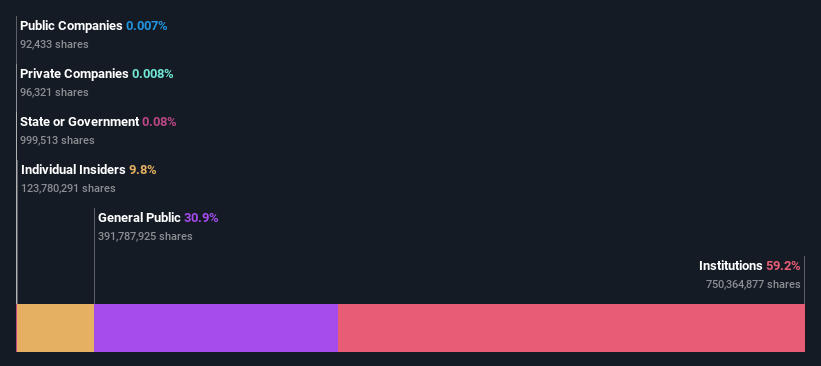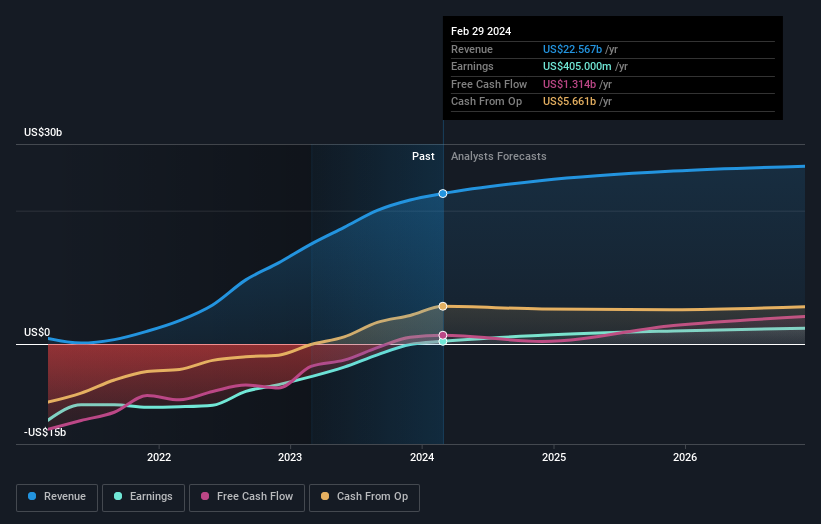Carnival Corporation & plc's (NYSE:CCL) US$1.0b market value fall may be overlooked by institutional investors after a year of 0.4% returns
Key Insights
Institutions' substantial holdings in Carnival Corporation & implies that they have significant influence over the company's share price
47% of the business is held by the top 25 shareholders
Using data from analyst forecasts alongside ownership research, one can better assess the future performance of a company
Every investor in Carnival Corporation & plc (NYSE:CCL) should be aware of the most powerful shareholder groups. We can see that institutions own the lion's share in the company with 59% ownership. In other words, the group stands to gain the most (or lose the most) from their investment into the company.
Institutional investors endured the highest losses after the company's market cap fell by US$1.0b last week. However, the 0.4% one-year return to shareholders might have softened the blow. We would assume however, that they would be on the lookout for weakness in the future.
In the chart below, we zoom in on the different ownership groups of Carnival Corporation &.
Check out our latest analysis for Carnival Corporation &
What Does The Institutional Ownership Tell Us About Carnival Corporation &?
Institutions typically measure themselves against a benchmark when reporting to their own investors, so they often become more enthusiastic about a stock once it's included in a major index. We would expect most companies to have some institutions on the register, especially if they are growing.
As you can see, institutional investors have a fair amount of stake in Carnival Corporation &. This implies the analysts working for those institutions have looked at the stock and they like it. But just like anyone else, they could be wrong. When multiple institutions own a stock, there's always a risk that they are in a 'crowded trade'. When such a trade goes wrong, multiple parties may compete to sell stock fast. This risk is higher in a company without a history of growth. You can see Carnival Corporation &'s historic earnings and revenue below, but keep in mind there's always more to the story.
Investors should note that institutions actually own more than half the company, so they can collectively wield significant power. Carnival Corporation & is not owned by hedge funds. Because actions speak louder than words, we consider it a good sign when insiders own a significant stake in a company. In Carnival Corporation &'s case, its Top Key Executive, Micky Arison, is the largest shareholder, holding 9.6% of shares outstanding. With 9.5% and 5.8% of the shares outstanding respectively, The Vanguard Group, Inc. and BlackRock, Inc. are the second and third largest shareholders.
Our studies suggest that the top 25 shareholders collectively control less than half of the company's shares, meaning that the company's shares are widely disseminated and there is no dominant shareholder.
While studying institutional ownership for a company can add value to your research, it is also a good practice to research analyst recommendations to get a deeper understand of a stock's expected performance. There are plenty of analysts covering the stock, so it might be worth seeing what they are forecasting, too.
Insider Ownership Of Carnival Corporation &
The definition of company insiders can be subjective and does vary between jurisdictions. Our data reflects individual insiders, capturing board members at the very least. Management ultimately answers to the board. However, it is not uncommon for managers to be executive board members, especially if they are a founder or the CEO.
Most consider insider ownership a positive because it can indicate the board is well aligned with other shareholders. However, on some occasions too much power is concentrated within this group.
Shareholders would probably be interested to learn that insiders own shares in Carnival Corporation & plc. The insiders have a meaningful stake worth US$1.9b. It is good to see this level of investment. You can check here to see if those insiders have been buying recently.
General Public Ownership
With a 31% ownership, the general public, mostly comprising of individual investors, have some degree of sway over Carnival Corporation &. While this group can't necessarily call the shots, it can certainly have a real influence on how the company is run.
Next Steps:
It's always worth thinking about the different groups who own shares in a company. But to understand Carnival Corporation & better, we need to consider many other factors. To that end, you should learn about the 2 warning signs we've spotted with Carnival Corporation & (including 1 which makes us a bit uncomfortable) .
If you would prefer discover what analysts are predicting in terms of future growth, do not miss this free report on analyst forecasts.
NB: Figures in this article are calculated using data from the last twelve months, which refer to the 12-month period ending on the last date of the month the financial statement is dated. This may not be consistent with full year annual report figures.
Have feedback on this article? Concerned about the content? Get in touch with us directly. Alternatively, email editorial-team (at) simplywallst.com.
This article by Simply Wall St is general in nature. We provide commentary based on historical data and analyst forecasts only using an unbiased methodology and our articles are not intended to be financial advice. It does not constitute a recommendation to buy or sell any stock, and does not take account of your objectives, or your financial situation. We aim to bring you long-term focused analysis driven by fundamental data. Note that our analysis may not factor in the latest price-sensitive company announcements or qualitative material. Simply Wall St has no position in any stocks mentioned.
Have feedback on this article? Concerned about the content? Get in touch with us directly. Alternatively, email editorial-team@simplywallst.com

 Yahoo Finance
Yahoo Finance 

